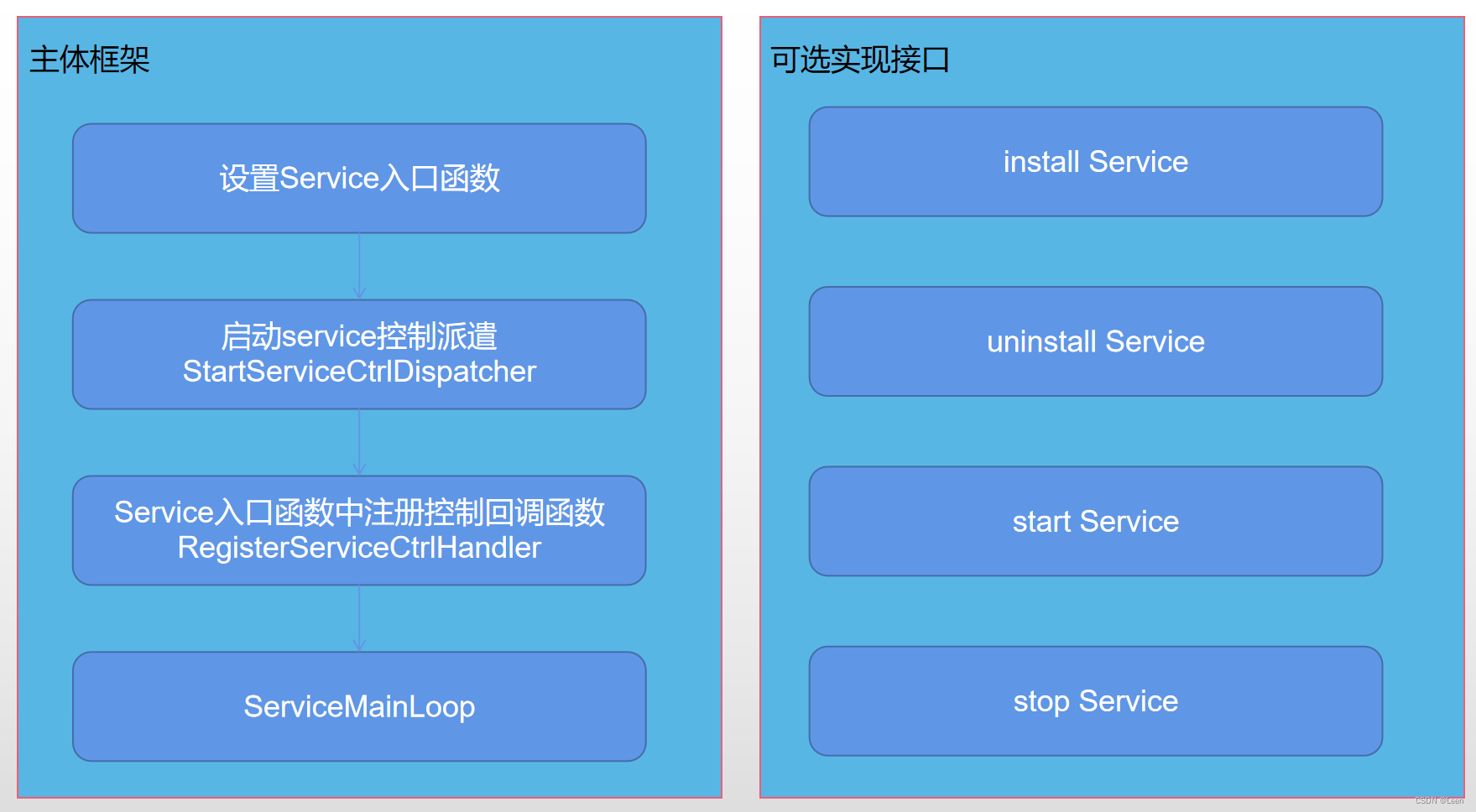Windows service 其实就是一个win32应用程序,特殊的地方就是服务会被 SC manager去统一管理,并且工作在 session 0,system 权限之下。
下面是开发一个windows service 的基本流程

下面我们就实现这样一个service, 可选接口是方便程序使用提供的一些接口
本文我们就实现 service的安装、卸载的功能。
首先我们创建一个win32的命令行程序
添加如下代码:
// WinService.cpp : 定义控制台应用程序的入口点。
//
#include "stdafx.h"
#include <windows.h>
#include <tchar.h>
#include <strsafe.h>
#pragma comment(lib, "advapi32.lib")
#define SVCNAME _T("LeenSvcName")
const DWORD SVC_ERROR = 10086;
SERVICE_STATUS gSvcStatus;
SERVICE_STATUS_HANDLE gSvcStatusHandle;
HANDLE ghSvcStopEvent = NULL;
VOID SvcInstall(void);
VOID SvcUnInstall(void);
VOID WINAPI SvcCtrlHandler(DWORD);
VOID WINAPI SvcMain(DWORD, LPTSTR *);
VOID ReportSvcStatus(DWORD, DWORD, DWORD);
VOID SvcInit(DWORD, LPTSTR *);
VOID SvcReportEvent(LPTSTR);
int _tmain(int argc, _TCHAR* argv[])
{
if (lstrcmpi(argv[1], TEXT("install")) == 0)
{
SvcInstall();
return 0;
} else if (lstrcmpi(argv[1], TEXT("uninstall")) == 0)
{
SvcUnInstall();
return 0;
}
// TO_DO: Add any additional services for the process to this table.
SERVICE_TABLE_ENTRY DispatchTable[] =
{
{ SVCNAME, (LPSERVICE_MAIN_FUNCTION)SvcMain },
{ NULL, NULL }
};
// This call returns when the service has stopped.
// The process should simply terminate when the call returns.
if (!StartServiceCtrlDispatcher(DispatchTable))
{
SvcReportEvent(TEXT("StartServiceCtrlDispatcher"));
}
return 0;
}
VOID SvcUnInstall()
{
SC_HANDLE schSCManager;
SC_HANDLE schService;
// Get a handle to the SCM database.
schSCManager = OpenSCManager(
NULL, // local computer
NULL, // ServicesActive database
SC_MANAGER_ALL_ACCESS); // full access rights
if (NULL == schSCManager)
{
printf("OpenSCManager failed (%d)\n", GetLastError());
return;
}
// Get a handle to the service.
schService = OpenService(
schSCManager, // SCM database
SVCNAME, // name of service
DELETE); // need delete access
if (schService == NULL)
{
printf("OpenService failed (%d)\n", GetLastError());
CloseServiceHandle(schSCManager);
return;
}
// Delete the service.
if (!DeleteService(schService))
{
printf("DeleteService failed (%d)\n", GetLastError());
}
else printf("Service deleted successfully\n");
CloseServiceHandle(schService);
CloseServiceHandle(schSCManager);
}
VOID SvcInstall()
{
SC_HANDLE schSCManager;
SC_HANDLE schService;
TCHAR szUnquotedPath[MAX_PATH];
if (!GetModuleFileName(NULL, szUnquotedPath, MAX_PATH))
{
printf("Cannot install service (%d)\n", GetLastError());
return;
}
// In case the path contains a space, it must be quoted so that
// it is correctly interpreted. For example,
// "d:\my share\myservice.exe" should be specified as
// ""d:\my share\myservice.exe"".
TCHAR szPath[MAX_PATH];
StringCbPrintf(szPath, MAX_PATH, TEXT("\"%s\""), szUnquotedPath);
// Get a handle to the SCM database.
schSCManager = OpenSCManager(
NULL, // local computer
NULL, // ServicesActive database
SC_MANAGER_ALL_ACCESS); // full access rights
if (NULL == schSCManager)
{
printf("OpenSCManager failed (%d)\n", GetLastError());
return;
}
// Create the service
schService = CreateService(
schSCManager, // SCM database
SVCNAME, // name of service
SVCNAME, // service name to display
SERVICE_ALL_ACCESS, // desired access
SERVICE_WIN32_OWN_PROCESS, // service type
SERVICE_DEMAND_START, // start type
SERVICE_ERROR_NORMAL, // error control type
szPath, // path to service's binary
NULL, // no load ordering group
NULL, // no tag identifier
NULL, // no dependencies
NULL, // LocalSystem account
NULL); // no password
if (schService == NULL)
{
printf("CreateService failed (%d)\n", GetLastError());
CloseServiceHandle(schSCManager);
return;
}
else printf("Service installed successfully\n");
CloseServiceHandle(schService);
CloseServiceHandle(schSCManager);
}
VOID WINAPI SvcMain(DWORD dwArgc, LPTSTR *lpszArgv)
{
// Register the handler function for the service
gSvcStatusHandle = RegisterServiceCtrlHandler(
SVCNAME,
SvcCtrlHandler);
if (!gSvcStatusHandle)
{
SvcReportEvent(TEXT("RegisterServiceCtrlHandler"));
return;
}
// These SERVICE_STATUS members remain as set here
gSvcStatus.dwServiceType = SERVICE_WIN32_OWN_PROCESS;
gSvcStatus.dwServiceSpecificExitCode = 0;
// Report initial status to the SCM
ReportSvcStatus(SERVICE_START_PENDING, NO_ERROR, 3000);
// Perform service-specific initialization and work.
SvcInit(dwArgc, lpszArgv);
}
VOID SvcInit(DWORD dwArgc, LPTSTR *lpszArgv)
{
// TO_DO: Declare and set any required variables.
// Be sure to periodically call ReportSvcStatus() with
// SERVICE_START_PENDING. If initialization fails, call
// ReportSvcStatus with SERVICE_STOPPED.
// Create an event. The control handler function, SvcCtrlHandler,
// signals this event when it receives the stop control code.
ghSvcStopEvent = CreateEvent(
NULL, // default security attributes
TRUE, // manual reset event
FALSE, // not signaled
NULL); // no name
if (ghSvcStopEvent == NULL)
{
ReportSvcStatus(SERVICE_STOPPED, GetLastError(), 0);
return;
}
// Report running status when initialization is complete.
ReportSvcStatus(SERVICE_RUNNING, NO_ERROR, 0);
// TO_DO: Perform work until service stops.
while (1)
{
// Check whether to stop the service.
WaitForSingleObject(ghSvcStopEvent, INFINITE);
ReportSvcStatus(SERVICE_STOPPED, NO_ERROR, 0);
return;
}
}
VOID ReportSvcStatus(DWORD dwCurrentState,
DWORD dwWin32ExitCode,
DWORD dwWaitHint)
{
static DWORD dwCheckPoint = 1;
// Fill in the SERVICE_STATUS structure.
gSvcStatus.dwCurrentState = dwCurrentState;
gSvcStatus.dwWin32ExitCode = dwWin32ExitCode;
gSvcStatus.dwWaitHint = dwWaitHint;
if (dwCurrentState == SERVICE_START_PENDING)
gSvcStatus.dwControlsAccepted = 0;
else gSvcStatus.dwControlsAccepted = SERVICE_ACCEPT_STOP;
if ((dwCurrentState == SERVICE_RUNNING) ||
(dwCurrentState == SERVICE_STOPPED))
gSvcStatus.dwCheckPoint = 0;
else gSvcStatus.dwCheckPoint = dwCheckPoint++;
// Report the status of the service to the SCM.
SetServiceStatus(gSvcStatusHandle, &gSvcStatus);
}
VOID WINAPI SvcCtrlHandler(DWORD dwCtrl)
{
// Handle the requested control code.
switch (dwCtrl)
{
case SERVICE_CONTROL_STOP:
ReportSvcStatus(SERVICE_STOP_PENDING, NO_ERROR, 0);
// Signal the service to stop.
SetEvent(ghSvcStopEvent);
ReportSvcStatus(gSvcStatus.dwCurrentState, NO_ERROR, 0);
return;
case SERVICE_CONTROL_INTERROGATE:
break;
default:
break;
}
}
VOID SvcReportEvent(LPTSTR szFunction)
{
HANDLE hEventSource;
LPCTSTR lpszStrings[2];
TCHAR Buffer[80];
hEventSource = RegisterEventSource(NULL, SVCNAME);
if (NULL != hEventSource)
{
StringCchPrintf(Buffer, 80, TEXT("%s failed with %d"), szFunction, GetLastError());
lpszStrings[0] = SVCNAME;
lpszStrings[1] = Buffer;
ReportEvent(hEventSource, // event log handle
EVENTLOG_ERROR_TYPE, // event type
0, // event category
SVC_ERROR, // event identifier
NULL, // no security identifier
2, // size of lpszStrings array
0, // no binary data
lpszStrings, // array of strings
NULL); // no binary data
DeregisterEventSource(hEventSource);
}
}
安装、卸载方式:

在任务管理器里确认下安装是否成功:

本代码主体参考了msdn代码示例:
Thanks~























 4040
4040











 被折叠的 条评论
为什么被折叠?
被折叠的 条评论
为什么被折叠?










